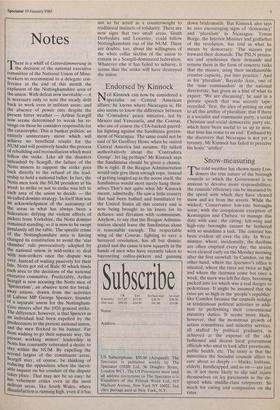Notes
/There is a whiff of Gotterdammerung in .1 the decision of the national executive committee of the National Union of Mine- workers to recommend to a delegate con- ference at the end of this month the explusion of the Nottinghamshire area of the union. With defeat now inevitable — it is necessary only to note the steady drift back to work even in militant areas, and the absence of power cuts despite the present bitter weather — Arthur Scargill now seems determined to wreak his re- venge on those he considers responsible for the catastrophe. This is bunker politics: an entirely unnecessary move which will achieve no beneficial results for the NUM and will positively hinder the process of rebuilding and reconciliation which must follow the strike. Like all the disasters unleashed by Scargill, the failure of the Notts miners to support the strike goes back directly to the refusal of the lead- ership to hold a national ballot. In fact, the Notts men took the NUM president at his word: to strike or not to strike was left to each area of the union to decide — the so-called domino strategy. In itself that was an acknowledgment of the autonomy of the areas in what has always been a federation: defying the violent efforts of pickets from Yorkshire, the Notts domino remained standing, so it is now to be swept petulantly off the table. The specific crime of the Nottinghamshire area is having changed its constitution to avoid the 'star chamber' rule provocatively adopted by the national union in mid-strike to deal with non-strikers once the dispute was over. Instead of waiting passively for their fate, Notts got rid of Rule 50 which binds each area to the decisions of the national executive committee. Predictably, Arthur Scargill is now accusing the Notts men of Spencerism', an abusive term for break- away unions, drawn from the activities of Labour MP George Spencer, founder a separate union for the Nottingham- saire miners after the 1926 general strike. The difference, however, is that Spencer as an individual had been expelled by the predecessors to the present national union, and the men flocked to his banner. Far from wishing to go their separate way, the present working miners' leadership in Notts has constantly reiterated a desire to stay, within the NUM. By expelling the second largest of the constituent areas, Scargill may, of course, be thinking of reducing the opposition when the inevit- able inquest on his conduct of the dispute takes place. That may not be so easy: he has vehement critics even in the most militant areas, like South Wales, where dissatisfaction is running high, even if it has not so far acted as a counterweight to traditional instincts of solidarity. There are now signs that two small areas, South Derbyshire and Leicester, could follow Nottinghamshire out of the NUM. There are doubts, too, about the willingness of the white collar section of the union to remain in a Scargill-dominated federation. Whatever else it has failed to achieve, it seems that the strike will have destroyed the union.










































 Previous page
Previous page